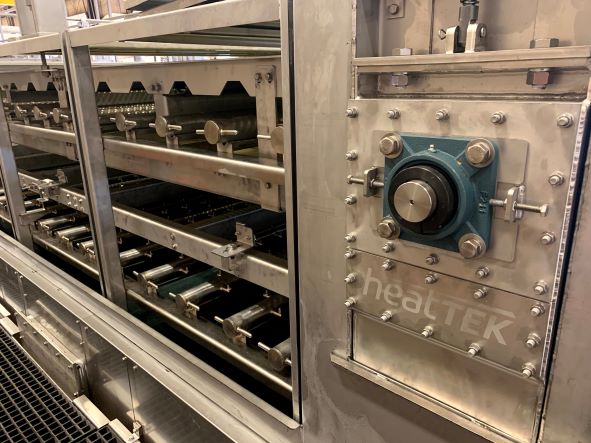Washer Retrofits and Rebuild options include but are not limited to:
- Complete front-end replacement (Stages 1-3)
- Nitric Hot Dip Passivation and Pickling on all Stainless Steel
- Complete Tank Removal & Replacement
- Structural Repair
- Hood Replacement with optimized access doors
- Roof Panel Replacement and Redesign
- Bolt-up Leveling bed replacement
- Bolt-up Herringbone replacement
- Adjustable Full Pack Can guide (Cable or Mechanical)
- Quick Disconnect Riser Upgrade
- Pump Replacement
- Heat Exchanger Replacement
- Header Pipe Layout, Design, and Replacement
- Coalescer Addition
- Exhaust Duct Replacement
- Mist Elimination Assembly
- Blow-off & Air Knife Systems
- Belt Vacuum Wipe System
- UHMW return roller upgrades
- Hold-down conveyor bearing box (with proprietary seal)
- Intralox S9000 main belt design upgrades
- Quick Adjust hold down and blow off upgrade (mechanical, semi-automatic, fully automatic)
- Electrical/Control Panel upgrades
Support Equipment and Services
HeatTek offers complete turnkey systems. Other products and equipment offered with our systems include:
- Mechanical Installation
- Electrical Installation
- Startup Service
- Preventative Maintenance Service
- Mechanical Audit Service
- Spare Parts
Commitment to Sustainability
Along with the world’s leading can makers, HeatTek understands and supports the importance of sustainable technology and net zero processes. Every detail is considered when engineering each of HeatTek’s Evolve Systems to ensure your sustainability goals are met or exceeded.
- Reduced gas usage through airflow and temperature optimization
- Minimized virgin water usage and chemical usage through RO technology
- Options for natural gas alternatives such as electric and infrared technology
- Recycled materials
- Consultations and audits for current system health and sustainability impact

